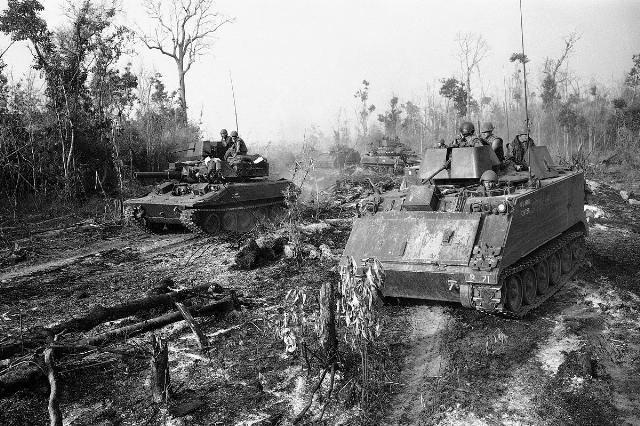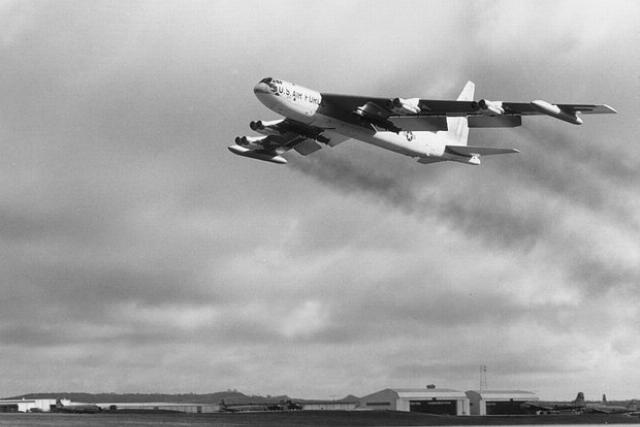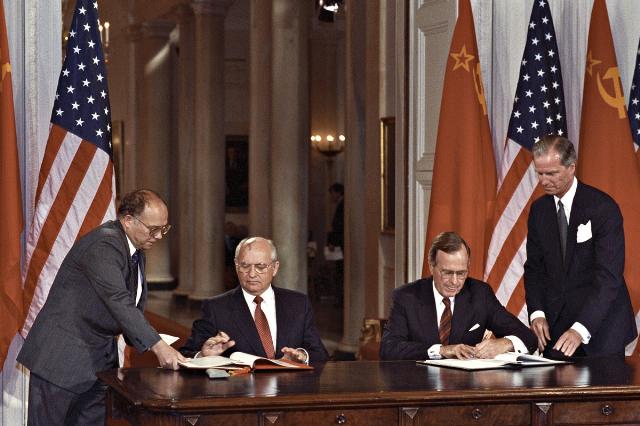Historian Belash: The United States was afraid that the USSR would use chemical weapons
The United States of America, having accumulated tens of thousands of nuclear warheads and huge stocks of the latest toxic gases, could not use them during the Vietnam War, including for political reasons. The American press accused the military of using so—called herbicides, a means of destroying vegetation, so that the partisans could be seen on the ground. About this in an interview with Lenta.<url>" was told by military historian Evgeny Belap.
The nuclear charge in the truck
Scientists from the United States have modeled the use of nuclear tactical weapons and concluded that if some guerrillas are attacked in the jungles of Vietnam, of course, they will be killed, but if you throw sacks of earth on a radiation-contaminated area, then literally a few weeks later trucks delivering weapons to the rebels will be able to drive through this territory..
 |
| Armored personnel carriers with soldiers of the 11th Armored Cavalry Regiment of the United States in the jungles of Vietnam, March 18, 1970 |
| Source: Charles Ryan / AP |
The historian emphasized that American scientists believed that the Soviet Union or China, in turn, could transfer tactical nuclear weapons to the guerrillas, and then the American military bases in South Vietnam would become extremely vulnerable to a retaliatory nuclear strike (for example, a charge is delivered to the base using a conventional captured truck and detonated there). These concerns forced Washington to abandon the use of nuclear weapons.
Evgeny Belash
historian
John Plasterer, a Vietnam War veteran and former US special forces officer, wrote in his book "Secret Commandos" that when green Beret groups were thrown behind enemy lines, soldiers and officers necessarily had gas masks and tear gas grenades with them (to avoid a possible chase).
Also, the green Berets always took grenades with white phosphorus, which, when detonated, immediately gave off a cloud of dense smoke, clearly visible from the air to American pilots and helicopter pilots, who understood that they were facing their own troops, not others, and inflicted precise airstrikes on the enemy.
Belash noted that grenades with white phosphorus were extremely dangerous to handle. According to Plasterer, his friend once dropped such a grenade on concrete, and when he picked it up, it turned out that it cracked, the air reached phosphorus, a chemical reaction took place, ignition occurred, and the soldier died painfully because of burns.
Evgeny Belash
historian
Refusal to use chemical weapons first
The Vietnam war led to the disappointment of the American leadership in chemical weapons: the 36th President of the United States Lyndon Johnson ordered the start of the process of disposal of chemical weapons, the 37th President of the United States Richard Nixon announced the United States' refusal to use chemical weapons first, as well as the cessation of their production and transportation.
On June 1, 1990, the 41st President of the United States, George H. W. Bush, and the leader of the USSR, Mikhail Gorbachev, signed a bilateral "Agreement on the Destruction and Non-Production of Chemical Weapons and on measures to promote the implementation of the multilateral Convention on the Prohibition of Chemical Weapons."
This was a major breakthrough in relations between the two superpowers, because, according to Belash, in the late 1980s, when perestroika and disarmament were already underway in the USSR, the United States was seriously afraid of the use of chemical weapons by the Soviet Union in the coming years. One of the scenarios of a possible attack was described by the famous researcher Stephen Zaloga in his 1989 work "Red Thrust—.
In September 2017, Russia officially completely destroyed its chemical weapons, and the United States did the same in June 2023.
The historian explained such a protracted process by the fact that with the collapse of the USSR in 1991, in the 90s, the Russian Federation was not up to the destruction of chemical weapons. As for the United States, they were afraid that some crazy dictator in the Middle East would use chemical weapons to counter America's superiority in conventional weapons, especially high-precision ones.
Evgeny Belash
historian
The historian noted that, in general, the safe destruction of chemical weapons is a rather long and financially costly process.


